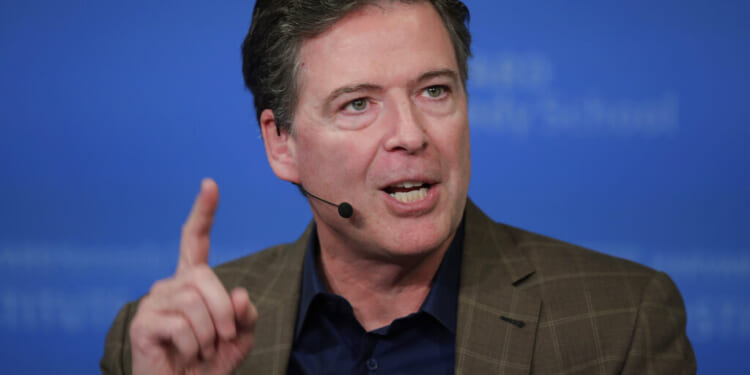This is not the place to analyze the details of former FBI Director James Comey’s indictment because we don’t know what those details are. Prosecutors will soon have to come up with a bill of particulars enumerating the specific lies they allege Comey told under oath. Of course, there are critics who say the whole thing is a disaster. For now, we don’t really know.
But we do know what happened in 2017. The new president, Donald Trump, was the target of wild speculation accusing him of “collusion” with Russia in the 2016 election. Comey, then head of the FBI, was in the middle of it, leading the bureau’s “Crossfire Hurricane” investigation.
When Trump was still president-elect, Comey, after long and careful planning, used a briefing on Russian election influence efforts as the pretext to ambush Trump with the so-called “pee tape” allegation from the debunked Steele dossier. It happened on Jan. 6, 2017, in Trump Tower in New York. At the end of the briefing, Comey said, “Can I have a few minutes alone with the president-elect?” With just the two men in the room, Comey hit Trump with the accusation that the Russians had recorded Trump with prostitutes performing kinky sex acts in a Moscow hotel room in 2013. Trump was left stunned and wondering whether the director of the FBI was setting him up for something.
For Comey, it was part of Crossfire Hurricane, an opportunity to question the key figure in the investigation under the guise of a security briefing. After the meeting, Comey dashed to an FBI car, where a laptop was waiting for him to write his version of what Trump said, for instant analysis by the Crossfire Hurricane team. (Many of the details and quotes in this newsletter are taken from Obsession, my 2020 book about the pursuit of Trump.)
Comey later wrote that as he prepared for the meeting, he was concerned that Trump would “assume I was pulling a J. Edgar Hoover,” a reference to the founding FBI director famous for keeping and using embarrassing information about politicians. In light of that, Comey said he tried to think of some way he could reassure Trump. “After extensive discussion with my team, I decided I could assure the president-elect that the FBI was not currently investigating him,” Comey wrote.
Sure enough, Trump was deeply concerned by Comey’s pee tape maneuver. “As he began to grow more defensive and the conversation teetered toward disaster,” Comey recalled, the FBI director used his reassurance plan, saying, “We are not investigating you, sir.” The statement “seemed to quiet him,” Comey wrote.
But was it really true that the FBI was not investigating Trump? Was Comey telling Trump the truth? Here is a passage from Obsession:
Comey seemed to believe it was quite clever to assure Trump that he was not under investigation, even as the investigation continued apace. Comey later wrote that telling Trump, “We are not investigating you, sir,” was “literally true” because the FBI “did not have a counterintelligence case file open on him.” But Comey was hairsplitting, and other FBI officials warned him that what he said was misleading. [FBI general counsel James] Baker told Comey as much in a pre-meeting planning session. Of course Trump is under investigation, Baker argued. His conduct might well be “within the scope of an investigation looking at whether his campaign coordinated with Russia.” But Comey was now on the record with Trump saying that the president-elect was not under investigation.
To no one’s surprise, Comey’s Trump Tower session with the president-elect leaked to the press a few days later, when CNN reported that the nation’s top intelligence officials presented Trump with “compromising personal” information — the story of the pee tape — that came from “a former British intelligence operative whose past work U.S. intelligence officials consider to be credible.” Trump-Russia hysteria, already at a high level, soared even higher.
But what about that key question: Is the president of the United States under FBI investigation? The untruth Comey told in Trump Tower soon came back into the picture when, on March 15, 2017, Comey talked privately to members of the Senate Judiciary Committee. As he had in the meeting with Trump, Comey told senators that Trump was not under investigation.
To any layman, and that included some members of the committee, it was obvious that the FBI was investigating Trump. What was Crossfire Hurricane about, if it did not include investigating Trump? And why would Comey have pulled the Hoover maneuver if Trump were not under investigation? But Comey assured senators that Trump was not under investigation.
Those conversations were in private meetings. Five days later, on March 20, Comey testified publicly before the House Intelligence Committee. There, he told a different story. He began by dramatically announcing, “I have been authorized by the Department of Justice to confirm that the FBI, as part of our counterintelligence mission, is investigating the Russian government’s efforts to interfere in the 2016 presidential election, and that includes investigating the nature of any links between individuals associated with the Trump campaign and the Russian government and whether there was any coordination between the campaign and Russia’s efforts.”
The obvious question was whether “individuals associated with the Trump campaign” included Trump. Comey was asked that repeatedly, by lawmakers from both parties, and each time he answered, “I’m not going to answer that.”
So behind closed doors, Comey confidently told members of Congress and Trump that Trump was not under investigation. In front of the cameras, under oath, Comey refused to say. That undoubtedly left the impression in many minds that the real answer was yes, the president was under investigation, which, of course, he was.
Sen. Charles Grassley (R-IA), chairman of the Senate Judiciary Committee, was appalled. Taking to X, formerly Twitter, later in the day on March 20, Grassley said, “FBI Dir Comey needs to be transparent + tell the public what he told me about whether he is or is not investigating POTUS.” That is all Grassley felt he could say because the briefing had been confidential. But Grassley knew that Comey had told him, straight out, that Trump was not under investigation. Grassley was angry that Comey was saying one thing in private and another in public. But that was Comey’s way.
The simple description of what happened is that Comey, in a private setting, lied to Trump on Jan. 6, 2017, and then, also in a private setting, lied to Grassley and other members of Congress on March 15, 2017. Then, in public on March 20, 2017, Comey refused to answer the question he had privately lied about.
Trump’s worries about Comey, serious before, became even more serious. In the wake of the Trump Tower incident, once he was president, Trump invited Comey to the White House. On Jan. 27, 2017, the two of them — and just the two of them — had dinner at the residence. There, Trump, according to Comey, said, “I need loyalty, I expect loyalty.”
Given what had happened in Trump Tower, with Comey surprising Trump with the salacious and debunked pee tape story, and then dashing out to assess the information with the Crossfire Hurricane prosecution team, it is not surprising that Trump would want assurances that the FBI director was not secretly seeking to prosecute him. What Trump did not know at the Jan. 27 dinner is that Comey, just like he did after the Trump Tower pee tape meeting, would leave the White House to write down his version of what Trump said. The two had later conversations, in person and on the phone, and Comey did the same thing after each one.
On May 9, 2017, Trump fired Comey. Exactly a week later, on May 16, 2017, the New York Times made a huge splash reporting that at that private dinner on Jan. 27, Trump asked Comey “at least two times for a pledge of loyalty — which Mr. Comey declined.” The story set off an uproar, with some commentators comparing Trump to a Mafia boss.
Comey, of course, leaked the information to the New York Times. But he did not do it directly. Instead, after he was fired, Comey gave the notes to a friend, Columbia University law professor Daniel Richman, who then read selected parts of the notes aloud to a New York Times reporter. Comey later said he went through a cutout “for a variety of reasons.” But whatever Comey’s tactical decisions were, the larger purpose of the leak was clear. “I thought that might prompt the appointment of a special counsel,” Comey said. If he could just stir enough controversy about the matter, Comey reasoned, the political pressure to appoint a counsel would be overwhelming. And indeed, it was; Comey got what he wanted a short time later, on May 17, 2017, with the appointment of Trump-Russia special counsel Robert Mueller.
In the end, it didn’t work. After two years of investigation that at times paralyzed the Trump White House, Mueller concluded that he could not establish that collusion, which he called “conspiracy” or “coordination,” had ever occurred. All of James Comey’s scheming and dissembling and too-clever-by-half statements failed to establish that the crime for which he and the Crossfire Hurricane team pursued Trump had ever even happened. On the other hand, Comey had done incalculable political damage to Trump’s presidency.
After it was all over, the inspector general of the Justice Department, Michael Horowitz, examined Comey’s actions. As an FBI employee, Comey was subject to rules requiring that he keep highly sensitive law enforcement material confidential, Horowitz noted. Instead, Comey leaked the memos in hopes of leveraging them into an investigation of the president of the U.S. Horowitz concluded that Comey had set a “dangerous example” for employees of the FBI. From Horowitz’s report:
By not safeguarding sensitive information during the course of his FBI employment, and by using it to create public pressure for official action, Comey set a dangerous example for the over 35,000 current FBI employees — and the many thousands more former FBI employees — who similarly have access to or knowledge of non-public information … Comey’s closest advisors used the words “surprised,” “stunned,” “shocked,” and “disappointment” to describe their reactions to learning what Comey had done … In a country built on the rule of law, it is of utmost importance that all FBI employees adhere to Department and FBI policies, particularly when confronted by what appear to be extraordinary circumstances or compelling personal convictions. Comey had several other lawful options available to him to advocate for the appointment of a special counsel, which he told us was his goal in making the disclosure. What was not permitted was the unauthorized disclosure of sensitive investigative information, obtained during the course of FBI employment, in order to achieve a personally desired outcome.
Could there be a more complete condemnation of Comey’s actions? Horowitz did it in a couple of paragraphs.
Now Comey is in the news again, facing criminal charges. Does this episode mean Comey lied under oath as alleged in the indictment? No, it doesn’t. But it does mean that no one should ever trust a word James Comey says.
















